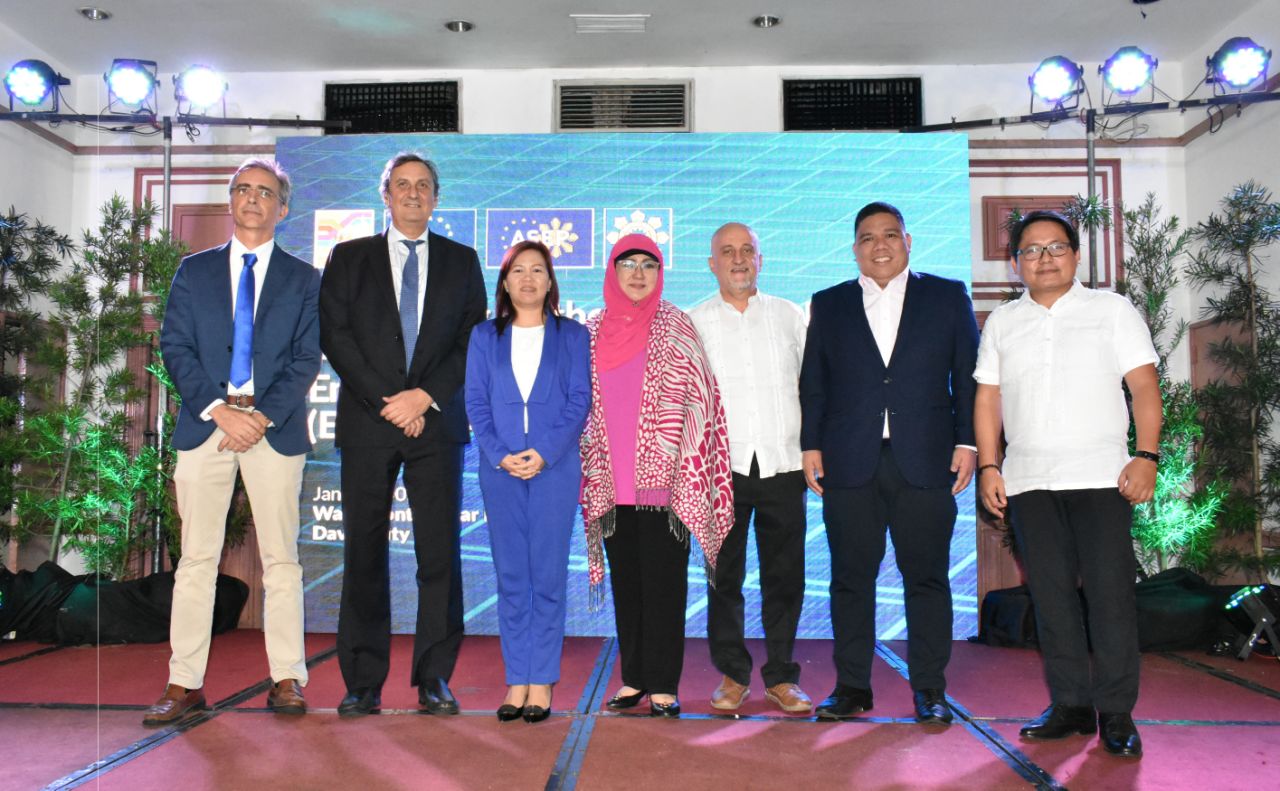
CLEAN ENERGY PROSPECTIVE: As part of the department’s policy in energizing remote areas in the country, the DOE and EU-ASEP delegation meet for the launching of seven renewable energy projects to our kababayans in Mindanao.
In photo are (L-R) European Union (EU) Programme Manager-Health Xavier Canton-Lamousse, EU Head of Development Cooperation Enrico Strampelli; Mindanao Development Authority (MinDA) Undersecretary Janet M. Lopoz; MiNDA Chief of Staff Bai Norhata Alonto; EU Programme Manager for Energy Willy Hick; DOE Assistant Secretary Redentor E. Delola; and MiNDA Assistant Secretary Romeo Montenegro.
DAVAO CITY – The Department of Energy (DOE) and the European Union (EU), through the Access to Sustainable Energy Programme (ASEP), launched seven renewable energy projects that would provide power to around 40,000 households in remote areas of the Philippines yesterday (30 January).
“Our goal is to provide electricity throughout the entire archipelago by 2020. These projects will bring more progress in Mindanao as thousands of Filipino families, particularly those living in far-flung areas of the region, will have access to power,” Energy Secretary Alfonso G. Cusi said.
The launching was led by DOE Assistant Secretary Redentor E. Delola, EU Head of Development Cooperation, Mr. Enrico Strampelli and Mindanao Development Authority Undersecretary Janet M. Lopoz.
According to Mr. Strampelli, the project awardees signed their respective contracts on 13 December 2018, right after the extension of the ASEP implementation period.
“Over the next three years, ASEP will continue to work with the DOE in improving the lives of vulnerable communities in the country,” he added.
EU will contribute €21 million to co-finance up to 80% of the projects which involve energy investments in the following areas: hybridization and income-generating activities through the introduction of productive uses of electricity; innovative provision of basic electricity supply and services for poor, disadvantaged areas; electrification for livelihood generation through the Solar Photovoltaic Home System in the Bangsamoro area; support to decentralized and mini grids; capacity building on rural electrification; energy efficiency measures; and renewable energy management.
The seven projects launched were:
• Strengthening Off-grid Lighting with Appropriate Renewable Energy Solutions (SOLARES): € 5 million grant to Mahintana Foundation, Inc.
• Improving the Lives of People in Off-Grid Communities in Mindanao through the Provision of Sustainable Energy: € 4.5 million grant to Yamog organization
• SolarBnB Microhotel & Island Livelihood Energizer (SMILE) - Platform: € 3.9 million grant to Kabang Kalikasan ng Pilipinas ng Pilipinas, or WWF Philippines
• Renewable energy technology for seaweed value added in Tawi-Tawi (RETS): € 4.2 million grant to United Nations Industrial Development Organization
• Renewable Energy Access for off-grid Communities and Households (REACH): € 3.7 million grant to People in Need
• Renewable Energy for Livelihood and Youth (RELY): € 2.2 million grant to Sequa
• Clean Energy Living Laboratories (CELLs): €3.8 million grant to Ateneo de Manila University
###
